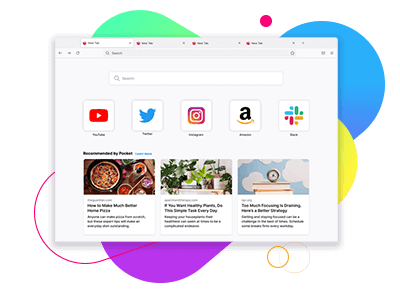Is Firefox a private browser?
Yes. Firefox protects your privacy with features like Private Browsing. It allows you to keep your browsing history and passwords private, even when using a device that you share with other people, such as a home computer or iPad.
Firefox also protects your privacy with Enhanced Tracking Protection to block trackers that follow you from site to site, collecting information about your browsing habits. It also includes protections against harmful scripts and malware.
Sidenote: We are not big tech. We do things differently. Being independent (no shareholders) allows us to put people first, before profit. Unlike other companies, we don’t sell access to your data.
What information does Firefox collect?
Mozilla (the maker of Firefox) takes privacy very seriously. Very seriously. In fact, every Firefox product we make honors our Personal Data Promise: Take less. Keep it safe. No secrets.
Read Firefox’s Privacy Notice for more info. Seriously, check it out. It’s in normal-sized font and everything.
